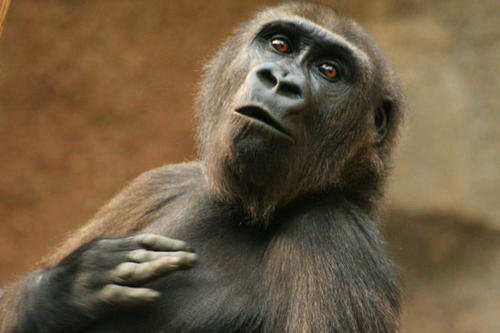Animals Have Personalities, Too
People are different. Animals are, too. Researchers at Freie Universität Berlin study what individual characteristics combine to form personality in apes – and what that tells us about ourselves.
Feb 24, 2011
Many properties used to describe personality differences in humans also apply to nonhuman primates.
Image Credit: Max-Planck-Institut für evolutionäre Anthropologie Leipzig
Bebe, Gorgo, and Viringika are gorillas. But they’re also TV stars: When the great apes at the Leipzig Zoo tussle, play, or take care of their young in front of the cameras in the documentary series Elefant, Tiger & Co., more than two million viewers tune in. Only a handful of them know that the three gorillas are also stars of another kind, playing a major role in personality research as well. Psychologist Jana Uher is an expert on comparative differential and personality psychology at Freie Universität Berlin. The behavioral researcher has been studying the individuality of apes for a long time now.
She found exciting inspiration for her studies in the gorillas at the Leipzig Zoo: As part of her research at the Max Planck Institute for Evolutionary Anthropology, in Leipzig, Uher gave the gorillas tasks in which they had a choice between two different-sized servings of food. They could choose either one or four raisins. Great apes instinctively reach for the larger serving, but in the experiment, they always received the other serving – not the one they had chosen. “You might think that a hundred-kilogram gorilla doesn’t care whether he gets one raisin more or less,” Uher explains. But the task was very frustrating for the animals. “It was incredibly interesting to observe how differently the animals dealt with that frustration,” the researcher recalls. Some of them beat on the windowpanes and threw downright temper tantrums. Others were silent, heaved a deep sigh, and slumped down. Still others distracted themselves from their frustration by pulling out individual strands of hair and playing with them – completely as if nothing were the matter. This key experience prompted Uher to take a closer look at the individuality of humans’ closest relatives. “Not one of the apes reacts like the next. It became clear to me that I want to study the individuality of primates in my future work.”
Thus far, scientists have focused more on studying the behavior of the “average ape.” But individual particularities are an especially exciting field for researchers, Uher believes. “Many comparative studies have shown that the differences between species are often quite minor. The individual differences, on the other hand, can sometimes be huge.”
Caring, fear, impulsiveness, curiosity, persistence, dominance – many of the characteristics we normally use to describe differences in human personalities also apply to our closest relatives in the animal kingdom, nonhuman primates. That’s a new development in the research in this field, as Uher points out. For a long time, the scientific community frowned upon any attempt to attribute personality traits to animals. But the researchers are not simply extending human characteristics to animals in this case. With primates in particular, people are inclined to attribute certain behavioral characteristics to the animals, which may or may not be accurate, Uher says. A chimpanzee’s broad “grin,” for instance, is less an expression of joy or fun than one of utter fear.
To distinguish the individual characteristics of animals as accurately as possible and record them systematically, Uher developed new approaches to her research. In Leipzig, she developed 14 different behavior tests to pinpoint the personality of the great apes at the Leipzig Zoo as accurately as possible. The results of these tests may also cast a whole new light on some of the results of prior research into primate intelligence. The researchers also hope to find some answers to a question that sounds almost philosophical: What makes us unique as humans? Thus far, one thing is clear: When it comes to personality, in many ways humans are more similar to apes than we might like.
Further Information
- Dr. Jana Uher, Department of Education and Psychology, Tel.: +49 (0)30 / 838-556 00
Email: jana.uher@fu-berlin.de

